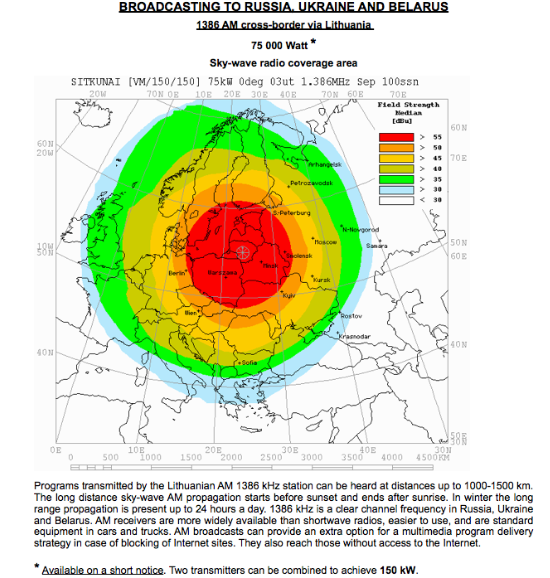BBG Watch Commentary
As predicted by many critics of the International Broadcasting Bureau (IBB), the Broadcasting Board of Governors’ (BBG) powerful management and technical arm, Radio Free Europe / Radio Liberty (RFE/RL) and Voice of America (VOA) affiliate stations were forced off the air in eastern Ukraine by pro-Russia rebels. Earlier, the Russian government stopped rebroadcasts of VOA Russian radio program in Moscow after it had terminated also all RFE/RL Russian rebroadcasts.
Critics accuse the IBB of not planning for such an eventuality and not being ready with AM and possibly also increased shortwave broadcasts to Russia and Ukraine, or being able to launch new satellite television programs in Russian on a short notice. IBB executives eliminated a direct satellite TV VOA Russian news program in 2008. Critics suspect that the IBB also does not have a contingency plan in case President Putin decides to block all VOA and RFE/RL websites in Russia. Only recently, the Broadcasting Board of Governors and its new chairman Jeff Shell have appointed a new three-person management team to replace some of the previous IBB executives.
The IBB staff in Washington has strongly resisted many previous and recent calls to start medium wave (AM) rebroadcasts of RFE/RL and VOA Russian and Ukrainian news programs to European Russia, Belarus, and Ukraine from a powerful leased transmitter located on the territory of Lithuania. Lithuania is a U.S. and NATO ally not subject to pressure from the Kremlin.
Critics of the IBB told BBG Watch that even though members of Congress from both parties have urged the IBB to do more surge radio and television broadcasting to Russia and Ukraine in response to President Putin’s annexation of Crimea, IBB executives reportedly did very little and have not considered the Lithuanian AM rebroadcasting option, or being new may not even know about it.
BBG Watch has learned that the the U.S. Embassy in Lithuania has forwarded a Lithuanian rebroadcasting proposal to the BBG, but it is not known whether IBB staffers or executives have received it or what they did with it at what level. The proposal was reportedly forwarded to the BBG by U.S. Ambassador to Lithuania Deborah A. McCarthy.
In the past, IBB staff had failed to respond to several such Lithuanian proposals. An IBB partner in Lithuania, who is a former Lithuanian government minister, felt snubbed and frustrated by this treatment, sources told BBG Watch.
###
BBG PRESS RELEASE
RFE/RL And VOA Affiliate Stations Forced Off The Air In Ukraine
MAY 12, 2014
WASHINGTON- Television and radio stations in eastern Ukraine carrying programming of Radio Free Europe/Radio Liberty and Voice of America have been forced off the air, depriving audiences of popular sources of unbiased news and information.
On May 12 at 10:30 a.m. local time, unidentified, Russian-speaking armed men forced employees to turn off the transmitter at a station in Donetsk used by RFE/RL broadcast affiliate Radio Era FM. The men then reconfigured the transmitter to broadcast programming from “Radio Respublika,” a previously unknown station airing Russian state radio programs and other pro-Russian content. RFE/RL programs normally run on Radio Era FM from 6-7 a.m. and 9-10 p.m. Monday through Friday but are currently off the air. This follows a shutdown of Radio Era’s FM transmitter in Crimea on March 9.
RFE/RL Editor-in-Chief Nenad Pejic condemned the Radio Era FM takeover, stating that “millions of Ukrainian citizens are being deprived of access to accurate, verifiable information about what is happening around them, at a crucial juncture in their lives. The seizure of Radio Era FM’s transmitter is a deplorable violation of the universal right to freedom of opinion and expression.”
Voice of America is also experiencing disruptions to its programming in the area. Channel 5, which broadcasts the VOA Ukrainian Service news program Chas-Time,has lost its terrestrial signal in several cities in the eastern part of the country, including Donetsk and Luhansk. According to Channel 5, several cable providers in the region have also been threatened, potentially further disrupting distribution via cable.
Despite the increasingly dangerous environment for reporters in the region, VOA and RFE/RL have been providing much-needed news and information. Threats to journalists in Ukraine have been escalating, and on May 1, an RFE/RL video crew was attacked while covering a demonstration in Kharkiv.
On May 2, masked, angry men carrying knives and axes threatened two VOA video reporters in Donetsk. In addition, a VOA reporter working in the Donetsk area returned to Kyiv for a few days after being warned that he was on a “snatch list” of journalists targeted for capture. He has since returned to Donetsk.
